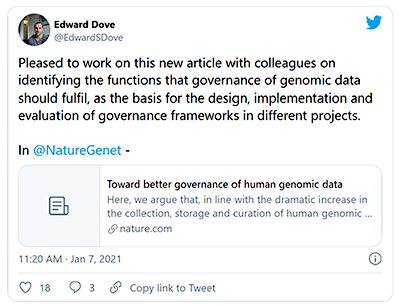By Carol Morton

22 February 2021. When you set out to create a major genomic initiative, your goal is to enable research into how different genetic combinations affect a person’s disease risk. You also want to protect privacy and unauthorized use of personal data.
No universal policy exists to help you navigate these dual goals of biomedical research and responsible use. But now, two dozen experts have compiled a best-practices guide to organize genomic research initiatives. They represent academic institutions on five continents: Europe, North America, Africa, Asia, and Australia.
In the January 2021 Nature Genetics, the group outlines five key functions of good governance, starting with data access for research. Their advice: Incentivize researchers to make their data available, address logistical and jurisdictional barriers, and adopt transparent policies and procedures for equitable data access.
The four other key functions include: compliance with laws; protection against possible harms; promotion of equity in data access and analysis; and use of data for the public benefit.
“Hopefully, the article will provide useful guidance to those setting up the governance of genomics initiatives around the world, including in the Nordics,” wrote co-author Heidi Beate Bentzen in an email. She is a researcher in law and medical ethics at University of Oslo, Norway. Bentzen also helps lead the legal working group of the Nordic Society of Human Genetics and Precision Medicine (NSHG-PM).

“There is no one way of setting up the governance of large genomics initiatives,” she wrote, “but there are certain key elements that must be present, and trade-offs that must be considered.”
Some of the five different governance functions may be in tension with each other, with competing values to balance and priorities to set. The paper itemizes three key trade-offs to consider—data access control, data de-identification, and models of informed consent by participants.
The paper illustrates how the key functions and trade-offs are handled in six large-scale international genomics projects. For example, in the Human Heredity and Health in Africa (H3Africa) Initiative, priority access is given to researchers in the project and those building capacity in Africa. Emphasis is placed on research that benefits African populations.
Guidance for Nordic efforts
The governance guidelines will aid emerging genomic initiatives in the Nordic countries, Bentzen wrote.
“There are various genomics and precision medicine in all the Nordic countries,” she wrote. “The NSHG-PM has previously described a Nordic precision medicine initiative, building on the Nordic strengths of universal healthcare, extensive health registries and biobanks, and large cohort studies.
“Additionally, most Nordic countries are also signatories to the European 1+ Million Genomes Initiative, where the aim is to have at least one million genomes accessible in the European Union by 2022, and to link genomic databases,” she wrote.
All of these need to set up governance structures—the national initiatives, the suggested Nordic initiative, and the EU initiative—and they will differ from each other.
Nordic policies will reflect regional differences and expectations. For example, “given the high level of digital literacy in the Nordics, these countries are ideal for electronic dynamic consent solutions,” she wrote.
Genomic research requires larger datasets and increased data sharing among countries. “Medical researchers in the Nordic countries rightfully experience a high degree of trust from the population,” she wrote.
Trustworthy governance is necessary for continued trust. “In line with the work of the NSHG-PM, this article shows the strengths of tailoring the ethical, legal, and societal aspects to the science in order to achieve governance structures that allow for world-class medical research in a manner that is highly respectful of the research participants,” she wrote.
Reference
Toward better governance of human genomic data.
O'Doherty KC, Shabani M, Dove ES, Bentzen HB, Borry P, Burgess MM, Chalmers D, De Vries J, Eckstein L, Fullerton SM, Juengst E, Kato K, Kaye J, Knoppers BM, Koenig BA, Manson SM, McGrail KM, McGuire AL, Meslin EM, Nicol D, Prainsack B, Terry SF, Thorogood A, Burke W.
Nat Genet. 2021 Jan;53(1):2-8.
Photo courtesy HB Bentzen

